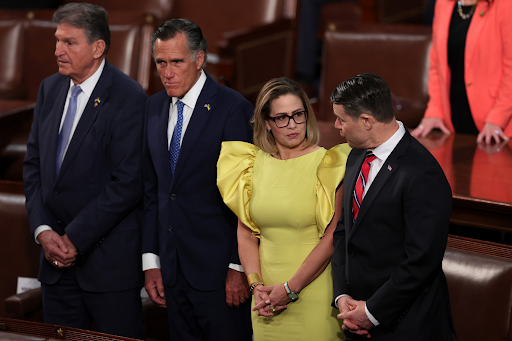Senator Mitt Romney (R-UT) has a long history in Republican politics that many people may be
unaware of. First losing a House election, then winning a governorship, losing a presidential election, and finally winning a Senate seat, Romney’s three decades in US politics do not lack complexity. But as the Senator from Utah announces his decision to retire from the US Senate, his impending absence bears a question that concerns many: What does the end of his career spell out for moderate lawmakers and the future of bipartisanship in America?
Romney’s historically anti-Trump and centrist policies are popular with a majority of Utah voters; his voter base does not plan to abandon the middle ground. In his wake, a moderate Republican might take up his mantle. Someone like former Utah state Representative Becky Edwards, a well-known center-right politician in Utah, may vie for his seat. Edwards recently saw some success in her race for the Republican nomination in Senate and Utah state congressional elections; her centrist policies may motivate voters to push for her candidacy in the Republican primary next year.
The future of bipartisanship looks more grim, however, in the context of electoral challenges to some of Romney’s fellow moderate colleagues, namely Senators Kyrsten Sinema (I-AZ) and Joe Manchin (D-WV). Sinema’s lack of loyalty to party lines motivated both Republican and Democratic challengers to contend for her seat in the upcoming Arizona senatorial election. Meanwhile, polls point to a very competitive election in 2024 for Manchin, the only statewide elected Democrat in West Virginia, as he faces strong Republican opposition to his Senate seat. As the middle ground comes to terms with the potential defeat of its biggest promoters, can moderates continue to hold sway in politics?
I believe so, but it will not come easy. Moderate lawmakers will have to make space for themselves in an increasingly partisan political playing field, and that means being vocal about their positions in order to garner support from the middle ground. Only then will they see success. Moderate Democrats, for example, had some significant wins in the 2022 election cycle. In an upset against popular Republican candidate Sarah Palin, Representative Mary Peltola (D-AK) won a special election for Alaska’s House seat and was reelected in 2022 for a full term. Peltola has found herself on the left side of issues such as healthcare and abortion but is more conservative on topics like gun rights. As the first Democrat to serve as Alaska’s representative in decades, she has gained popularity among independent voters in her state and has formed a strong coalition that will likely promote future success in her career as representative.
Donald Trump and politicians spawned from his presidency, like Governor Ron DeSantis (R-FL) and presidential candidate and businessman Vivek Ramaswamy, have a firm hold on Republican politics. With the shadow of MAGA politics looming over the conservative side of the aisle, many find it hard to trust the moderate bloc’s ability to evade the forces of popular extremism. But when Trump-backed candidates did not perform well in the 2022 midterm elections, many right-leaning voters and independents began to question whether there is a way to return to the brand of Republicanism championed by Paul Ryan and John McCain.
Now, moderate conservatives are looking to the likes of former South Carolina Governor and UN Ambassador Nikki Haley to carry the torch of respectable Republicanism. Although she had a record of strong conservative policy during her tenure as governor, it seems that Haley has begun pandering to independent and moderate voters for support in the Republican primary. In a recent Republican presidential debate, Haley vocalized her desire to seek bipartisan consensus on polarizing issues like abortion. She even went against the prominent Republican position on Russian aggression, demanding that the United States send support to Ukraine. It is clear Haley is trying to become the centrist choice for the Republican nomination, particularly among voters who find themselves detached from the modern right. But in order to overcome Trump’s cult of personality in conservative politics and secure a future on the national Republican stage, moderate candidates like Haley have to play their cards right in 2024.
Haley has seen a jump in the primary polls in a few key states, rising to become Trump’s most formidable opponent. Her bipartisan rhetoric seems to be attracting more Republican voters than the ultra-conservative talking points raised by her close competitors, DeSantis and Ramaswamy. Although some of her opponents started to call out Trump in the second Republican primary debate, they have largely tiptoed around the former president, perhaps thinking they could be his vice presidential pick. Trump undeniably has the upper hand, and in order to gain ground on him, Haley has to take him on directly and show the party why he is not the man for the job.
As the first former president to be indicted—and four times at that—Trump certainly does not have the cleanest record of the bunch. Now, he is facing a corporate fraud case against him in New York, and his business is on the line. Unwilling to confront his opponents on the public stage, he has not appeared at any of the primary debates. If Haley wants to be the leader of the post-Trump Republican Party, she needs to separate herself from her former boss and start pointing to his failures. She must show her party how different a Haley ticket would be from a Trump ticket in 2024. Although it is not clear right now how she stands out, she has some time to fix her rhetoric to champion a case for the conservative middle ground.
As the parties seemingly become more and more polarized each election cycle, moderates watch the proponents of bipartisanship, hopeful that they will garner support in the name of political compromise.
